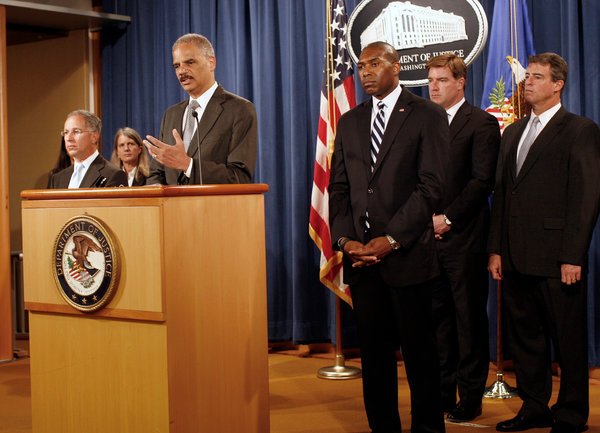Financial companies have NOT paid at least $164 billion in more than 100 mortgage-related settlements since 2009 the headlines have been lying to you:
Where Does the Mortgage Settlement Money Go?

Since the 2008 housing crisis, federal regulators have touted billion-dollar settlements, which, by giving certainty to investors, are often accompanied by a jump in the bank’s stock price.
Financial companies have paid at least $164 billion in more than 100 mortgage-related settlements since 2009, according to an analysis by the law firm of Keefe, Bruyette & Woods. Below, we examine the eight banks that have paid the most and explain how the largest payments were divided up.
1. Bank of America: $71.23 billion in 24 settlements
The bank has settled mortgage-related cases with a plethora of federal and state regulators as well as investors from the Justice Department and the State Teachers Retirement System of Ohio. A number of these settlements are tied to Bank of America’s purchase of Countrywide Financial and Merrill Lynch.
In 2014, the bank paid the single largest government settlement by a company in American history: $16.65 billion. Some of this is in the form of “soft money,” or help for borrowers. The bank also gets credit for writing down loan balances. And the pain is significantly reduced by tax deductions.
“The real financial cost to the bank could be considerably lower,” said Laurie Goodman, a specialist in housing at the Urban Institute. “This is helping consumers, but it may not be costing the bank.”
Related
Settling for $16 Billion, Bank Knows It Will Pay Much Less (Aug. 22, 2014)
2. JPMorgan Chase: $31.07 billion in 13 settlements
JPMorgan’s largest payout — $13 billion — centered on the sale of troubled mortgage securities to investors in the run-up to the crisis. The only fine in that 2013 case came from federal prosecutors in Sacramento, who took $2 billion of the penalty and deposited it into a fund at the United States Treasury. The next chunk, roughly $7 billion, went a range of federal and state authorities.
The Justice Department earmarked $4 billion to help struggling homeowners in hard-hit areas like Detroit.
Related
Where Does JPMorgan’s $13 Billion Go? (Nov. 20, 2013)
3. Citigroup: $12.26 billion in nine settlements
Federal prosecutors got creative in holding Citigroup accountable. As part of a $7 billion settlement in 2014, the bank agreed to provide $180 million in financing to build affordable rental housing.
The deal also includes $2.5 billion in so-called soft dollars for the financing of rental housing, mortgage modifications, down-payment assistance and donations to legal aid groups.
Related
Citi Settles Mortgage Securities Inquiry for $7 Billion (July 15, 2014)
4. Wells Fargo: $10.56 billion in eight settlements
In 2012, state and federal authorities announced a $26 billion mortgage settlement with big banks. The bulk of the settlement, about $20 billion, went to one million American homeowners who would have their mortgage debts reduced or their loans refinanced at lower interest rates.
The settlement also includes $1.5 billion for roughly 750,000 people who lost their homes to foreclosure between 2008 and 2011, with each receiving between $1,500 and $2,000.
Millions of mortgages owned by the government’s housing finance agencies, Fannie Mae and Freddie Mac, weren’t covered under the deal, excluding about half of the nation’s mortgages.
Related
Mortgage Plan Gives Billions to Homeowners, but With Exceptions (Feb. 10, 2012)
5. Deutsche Bank: $9.13 billion in two settlements
Germany’s largest bank reached a $7.2 billion deal this week to resolve a federal investigation into its sales of toxic mortgage securities. The civil settlement requires Deutsche Bank to pay a $3.1 billion penalty and provide relief to American consumers valued at $4.1 billion. The bank said the consumer portion is expected to be “primarily in the form of loan modifications and other assistance to homeowners.”
Related
Deutsche Bank to Settle U.S. Inquiry Into Mortgages for $7.2 Billion (Dec. 23, 2016)
6. Morgan Stanley: $7.92 billion in nine settlements
The bank paid $3.2 billion to strike a settlement this year with federal and state authorities over its creation of mortgage-backed bonds. About $400 million went to consumer relief.
Related
Morgan Stanley Will Pay $3.2 Billion Over Flawed Mortgage Bonds (Feb. 12, 2016)
7. Goldman Sachs: $7.26 billion in seven settlements
The bank paid $5.1 billion to settle with state and federal officials this year. But Goldman will be able to reduce its bill by as much as $1 billion through government incentives and tax credits.
“They appear to have grossly inflated the settlement amount for P.R. purposes to mislead the public, while in the fine print enabling Goldman Sachs to pay 50 to 75 percent less,” said Dennis Kelleher, the founder of the advocacy organization Better Markets, referring to the government announcement. And that is before the tax benefits of the deal are included.
Related
Goldman’s Settlement on Mortgages Is Less Than Meets the Eye (April 12, 2016)
8. Credit Suisse: $6.28 billion in three settlements
The Swiss bank agreed this week to pay $5.3 billion to settle an investigation by the United States authorities into the packaging and sale of mortgages. Credit Suisse said it would pay a civil penalty of $2.48 billion and provide unspecified relief to American consumers valued at $2.8 billion over five years.
Related
Credit Suisse to Pay $5.3 Billion to Resolve Mortgage Inquiry (Dec. 23, 2016)